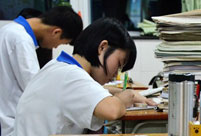 Luoyang aims to become 'Chinese Culture City'
Luoyang aims to become 'Chinese Culture City'
 Century-old jade disc found confirms ancient legend
Century-old jade disc found confirms ancient legend
 A serious mind behind Chinese leader
A serious mind behind Chinese leader
 Panda Cubs to Predict 2014 World Cup Winners
Panda Cubs to Predict 2014 World Cup Winners
 China Southern Airlines flight attendants win titles in service contest
China Southern Airlines flight attendants win titles in service contest
 Pupil's performance art persuades people to stop smoking
Pupil's performance art persuades people to stop smoking
 Nie Chenxi's clay tigers
Nie Chenxi's clay tigers
 Children's Day wishes
Children's Day wishes
 Chinese Kung Fu charms Silicon Valley
Chinese Kung Fu charms Silicon Valley
 Tranquil Yankou ancient town
Tranquil Yankou ancient town
China's rapid accumulation of foreign exchange reserves is leading to difficulties in steering economic policy, analysts and officials with the foreign exchange regulator said on Thursday.
The nation will keep reserves at a "reasonable" level, officials of the State Administration of Foreign Exchange said in an online interview.
"The excessively large foreign exchange reserves increase domestic money supply and create potential domestic inflation pressure," said Huang Guobo, chief economist of the SAFE. "They also put more pressure on the central bank to raise reserve requirement ratios and sterilize (inflows)."
Foreign currency reserves account for more than 80 percent of the central bank's assets, leading to an asset-liability mismatch that generates foreign exchange risks, Huang said.
Reserves reached $3.95 trillion at the end of March, having surged from $3.82 trillion at the end of 2013, official data released in April showed. The increase reflected continued trade surpluses and steady inflows of capital.
A rise in capital inflows and foreign direct investment last year forced the People's Bank of China to purchase foreign currency, partly to stop the yuan from appreciating. China's exports rose 7 percent year-on-year to $195.47 billion in May.
Xu Hongcai, a senior economist with the China Center for International Economic Exchanges, said he believed that $1 trillion would be sufficient for the nation's foreign exchange reserve.
He urged officials to focus on balancing the country's international payments so that reserves won't get even bigger.
"The fact that senior leaders acknowledge that the country's foreign exchange reserves are too big marks a historic change. Previously, many people believed that 'bigger was better' when it came to foreign reserves," said Xu.
Guan Tao, head of the SAFE's international payments division, said that the pace at which reserves build up will slow as the country seeks to reduce its trade imbalances and curb hot money inflows.
As a percentage of GDP, China's trade surplus fell to 2 percent last year from 10.1 percent in 2007, Guan said.
Increased two-way yuan volatility since February has helped curb arbitrage activities, because it has produced divergent market views on the yuan's direction, Guan said.
"Two-way volatility has occurred as the market believes the yuan exchange rate has basically reached a balanced and reasonable level, which limits risk-free arbitrage activities," Guan said.
This week, the yuan has gained about 0.4 percent against the dollar.
From Friday to Tuesday, the yuan strengthened 257 basis points against the dollar, measured by its central parity rate, the largest three-day move since April 2013, according to a research note from HSBC Holdings Plc.
The PBOC is sending a strong message to the market that the yuan will exhibit increased two-way volatility. The timing for re-injecting volatility is also a nod to tentatively stabilizing economic conditions, as indicated by May exports, according to Wang Ju, a senior foreign exchange strategist at HSBC.
The central bank's actions are in line with its focus on foreign exchange policy this year, inducing more volatility in the exchange rate to discourage one-way positioning, whether positive or negative, Wang said.
Premier Li Keqiang said in May that the reserves had become a headache whose continued rise could stoke inflation in the long term.
Inflation as measured by the consumer price index edged up to a four-month high of 2.5 percent in May but remained well within the government's comfort zone, giving China ample room to step up targeted measures to support the slowing economy.
The government is making such efforts, but top leaders have ruled out any large stimulus, with the country still coping with the aftermath of a 4 trillion yuan ($640 billion) stimulus plan implemented during the 2008-09 global financial crisis, which took local governments deep into debt.
The SAFE reiterated plans to use some of the reserves for outbound investment and to improve the way it manages the reserves.

 Can't take eyes off national teams in World Cup
Can't take eyes off national teams in World Cup Graduation photos bring memories back to life
Graduation photos bring memories back to life Art school students present works in Nanjing
Art school students present works in Nanjing Xinjiang's first high-speed railway goes on trial run
Xinjiang's first high-speed railway goes on trial run 3D Sea-life Themed Art Garage unveiled in Zhengzhou
3D Sea-life Themed Art Garage unveiled in Zhengzhou
 Creative Photos go viral during graduation season
Creative Photos go viral during graduation season Students in last-minute effort for Gaokao
Students in last-minute effort for Gaokao Opening ceremony of 67th Cannes Film Festival
Opening ceremony of 67th Cannes Film Festival Pulse of Xiamen - Int'l Yoga art festival in May
Pulse of Xiamen - Int'l Yoga art festival in May Top 20 hottest women in the world in 2014
Top 20 hottest women in the world in 2014  Dali, an ideal summer vacation destination
Dali, an ideal summer vacation destination Xichan Temple's little monk hit the Internet
Xichan Temple's little monk hit the Internet Monologue of a modern dancer
Monologue of a modern dancer College girl proposes to boyfriend on Weibo
College girl proposes to boyfriend on Weibo Special operation members in counter-terrorism training
Special operation members in counter-terrorism trainingDay|Week|Month